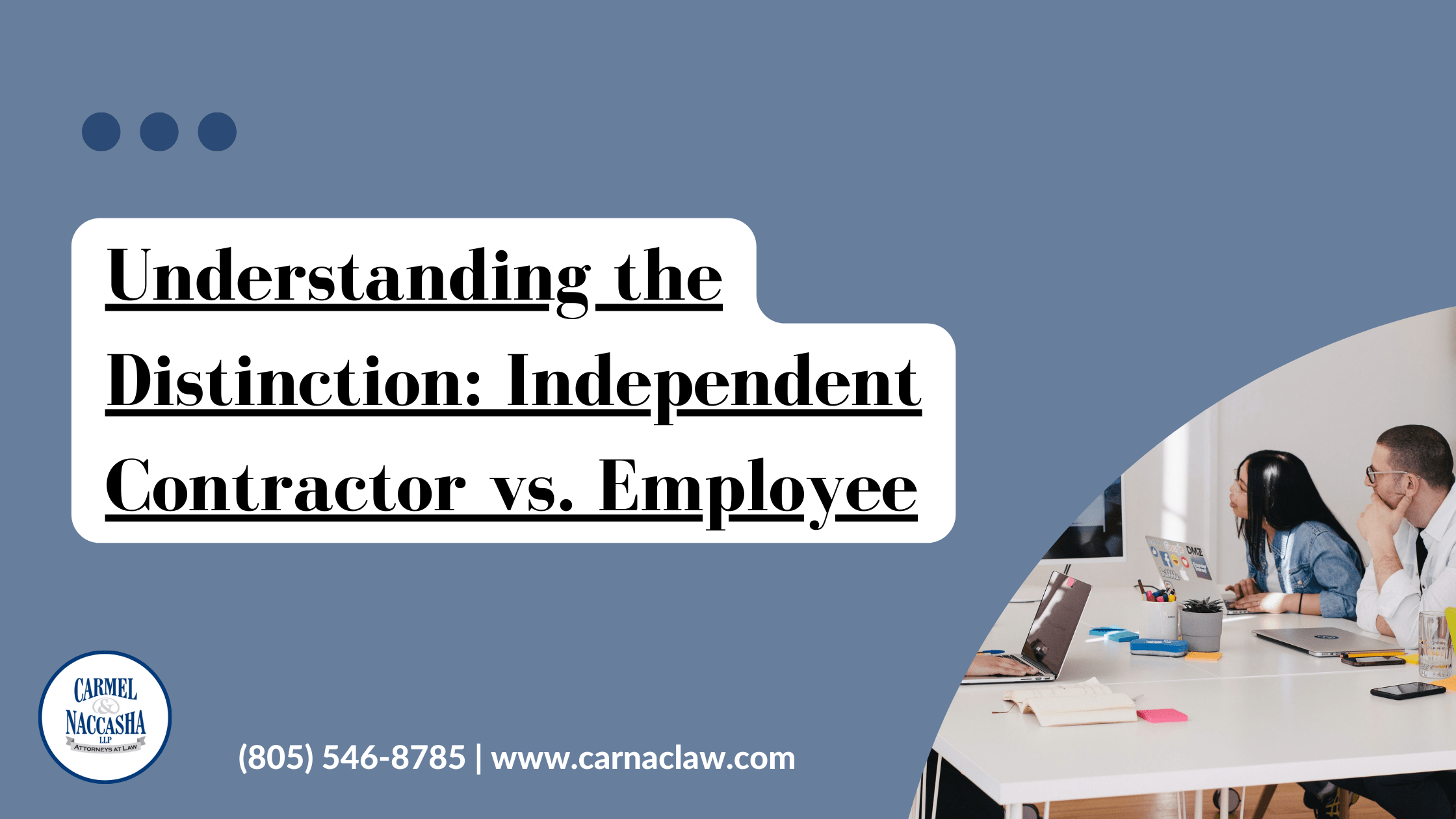Independent Contractor vs. Employee
Every business owner should be aware that there are two main classifications of workers: independent contractors and employees. While both play important roles in the workforce, it is important to understand the legal distinctions between the two. If you own a business, having a comprehensive understanding of the key differences, as well as the legal implications associated with each classification, is imperative, and will help you to avoid costly mistakes.
Defining Independent Contractors and Employees: Key Differences
An independent contractor is an individual or a business entity that provides services to another party under a contract. Independent contractors are considered self-employed, and are responsible for managing their own business operations. The parties usually, and ideally should, have a business contract, which sometimes specifies financial consequences for termination. On the other hand, an employee is an individual who works for an employer, usually on an at-will basis. The employer has control over most, if not all, aspects of the employee’s work, and is responsible for providing certain benefits and protections.
On the topic of control, one of the primary differences between independent contractors and employees lies in the level of control and independence they have over their work. Independent contractors have almost complete autonomy and control over how they perform their work. They have the freedom to set their own hours, choose their clients, and determine the methods and tools they use to complete their tasks. In contrast, employees typically have less control over their work and are subject to the direction and supervision of their employer.
Another crucial distinction is the tax and legal obligations associated with each classification. Independent contractors are responsible for paying their own taxes, including self-employment taxes. They are also responsible for obtaining their own insurance coverage and benefits. On the other hand, employers are responsible for withholding and remitting taxes on behalf of their employees. They are also required to provide certain benefits, such as workers’ compensation and unemployment insurance.
AB5 and the ABC Test: California’s Worker Classification Law
The distinction between independent contractors and employees is particularly important in California, which enacted Assembly Bill 5 (AB5) on January 1, 2020. AB5 expanded on a ruling made in a case that reached the California Supreme Court in 2018. In that landmark case, Dynamex Operations West, Inc. vs. Superior Court of Los Angeles, the California Supreme Court ruled that companies must use a three-pronged test (known as the ABC test) in determining whether to classify workers as employees or independent contractors. The ABC test assumes workers are employees unless the company that hires them can prove the following three things:
- The worker is free to perform services without the control or direction of the company;
- The worker is performing work tasks that are outside the usual course of the company’s business activities; and
- The worker is customarily engaged in an independently established trade, occupation, or business of the same nature as that involved in the work performed.
On Sept. 4, 2020, the California legislature passed Assembly Bill 2257, which exempts a lengthy list of job, independent contractor and gig worker categories from AB5. Please check with your Human Resources Department, or Legal Counsel, to be certain your company is in compliance with either AB5 or a statutory exemption if your company has workers that are classified as independent contractors.
Divergent Legal Protections
The legal protections and rights afforded to independent contractors and employees differ significantly. Independent contractors are not entitled to the same legal protections as employees, such as minimum wage laws, overtime pay, and protection against wrongful termination. They are also not eligible for certain benefits, such as health insurance and retirement plans, unless they arrange for them independently. Employees, on the other hand, are entitled to some or all of these protections and benefits under various labor laws.
Determining whether an individual should be classified as an independent contractor or an employee is not always straightforward. The classification depends on several factors, including without limitation, the level of control exerted by the employer, the nature of the work performed, and the degree of independence of the worker. Various tests and criteria have been developed by courts and government agencies to help determine the proper classification.
Risks of Worker Misclassification
Misclassifying workers can have serious legal and financial consequences for employers. It is essential for employers to carefully evaluate the nature of the working relationship and consult legal professionals if there is any uncertainty. Additionally, independent contractors should be aware of their rights and responsibilities to ensure they are properly compensated and protected.
The legal distinction between an independent contractor and an employee is significant and complex. Independent contractors have more control and independence over their work, while employees have less autonomy but are entitled to certain legal protections and benefits. Understanding these differences is crucial for both employers and workers to ensure compliance with labor laws and to protect their rights and interests.
Contact a Legal Professional
The information provided herein does not, and is not intended to, constitute legal advice; instead all information, content, and materials are for general informational purposes only. Neither this website nor this post are intended to create an attorney-client relationship.
If you have any questions, please contact Carmel & Naccasha, and for more details, read our full disclaimer.
Emilie Elliott is a Partner at Carmel & Naccasha specializing in employment law, corporate and business transactions, industrial health and safety and intellectual property. If you have any questions about this article, or for further questions you may have regarding employment law, please contact attorney Emilie Elliott.



